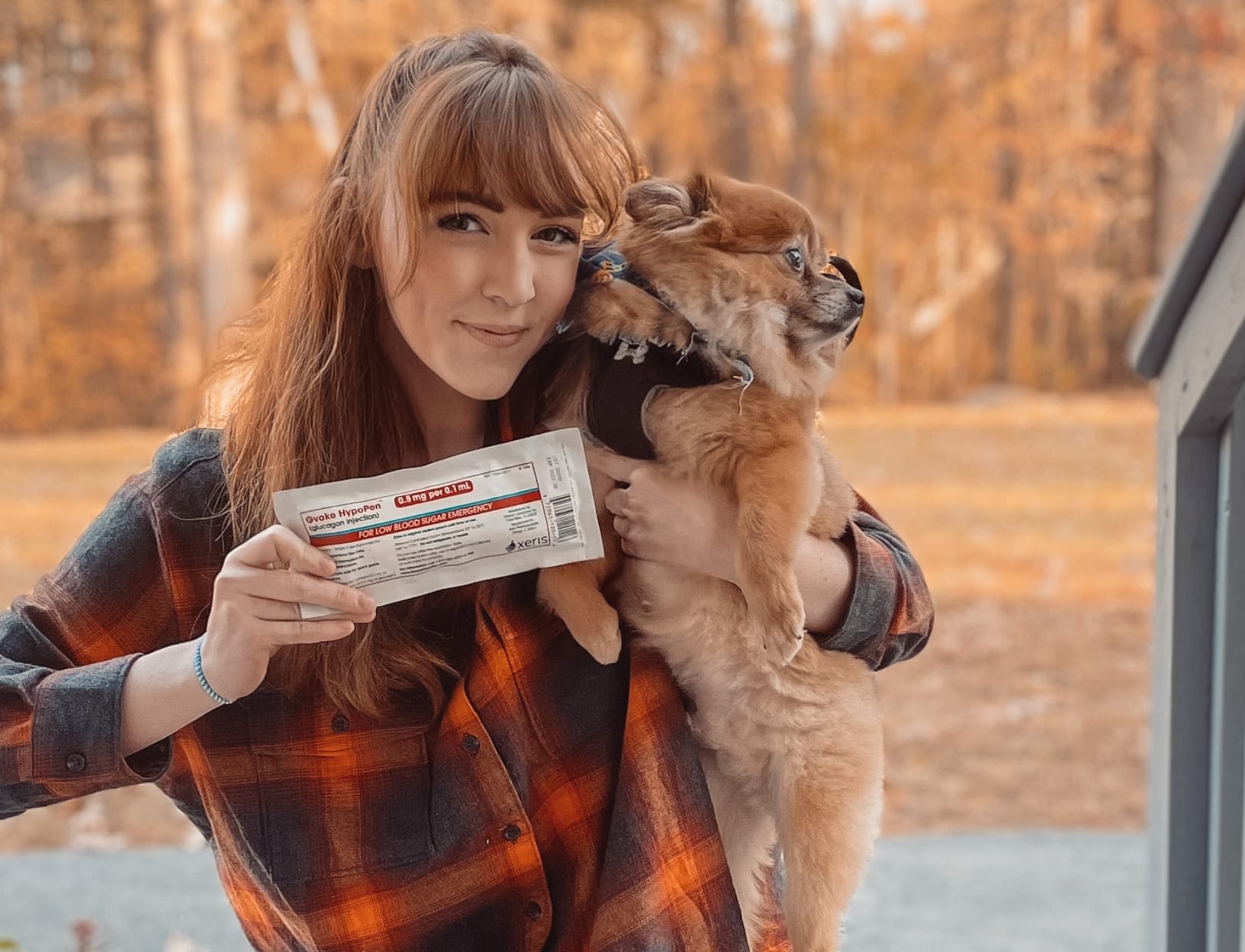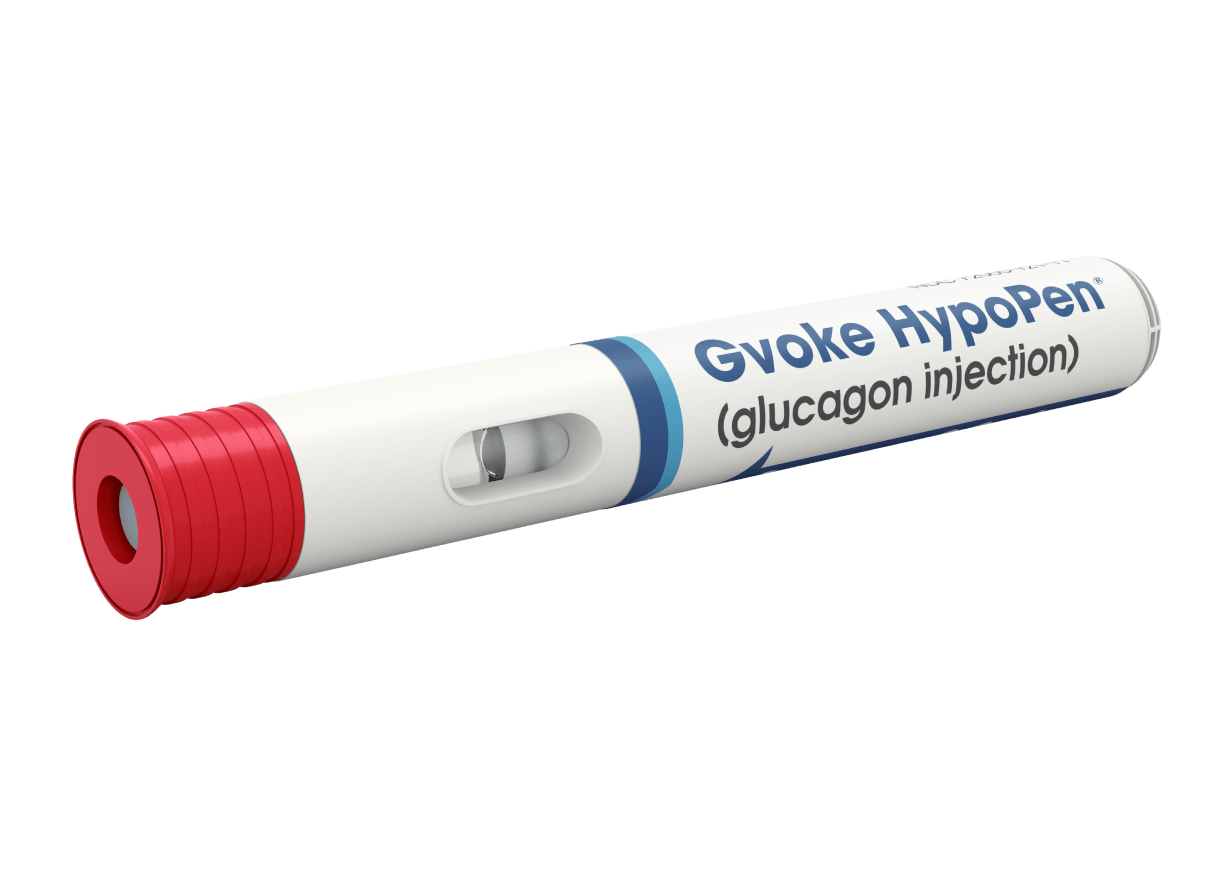
Give Patients With Diabetes a Safety Net
Indication: GVOKE (glucagon) injection is an antihypoglycemic agent indicated for subcutaneous use for the treatment of severe hypoglycemia in adult and pediatric patients aged 2 years and older with diabetes.
Gvoke HypoPen (glucagon injection) is the ready-to-use rescue pen that patients can count on to bring very low blood sugar glucose levels back up quickly.1†
Store in original sealed pouch until time of use.
†In a pooled analysis of 2 clinical studies in adults, mean time to treatment success was 13.8 minutes with treatment success defined as plasma glucose increase from mean value (< 50 mg/dL) at time of glucagon administration to absolute value greater than 70 mg/dL or relative increase of 20 mg/dL or greater.
*Indicates mandatory fields.
By clicking “Request a free demo pen,” I understand I am giving Xeris Pharmaceuticals, Inc., its affiliates, and business partners permission to use the personal information provided in this registration form to contact me by the following methods mail, email, telephone call, other digital communication platforms (i.e., SMS, Social Media, Programmatic Display) or in-person about disease and product information, disease or product related events, support services, market research, and to share promotional and marketing information. By submitting this form, I consent to these uses and am confirming that I have read and agree to the Xeris Pharmaceuticals Terms of Use and Privacy Statement.

Guidelines recommend ready-to-use glucagon

Glucagon is underutilized and under-prescribed

Patients don’t have glucagon when they need it
‡Results from an online survey in adults with self-reported type 1(n=110) or type 2(n=109) diabetes treated with insulin who experienced a recent severe hypoglycemic event(in the past 3 years).
Help Ensure Patients Are Ready To Treat Severe Lows
Diabetes guidelines acknowledge that:
- Patients taking insulin or insulin secretagogues are at increased risk for hypoglycemia2,5
- Patients taking insulin or insulin secretagogues should have a prescription for ready-to-use glucagon2
But glucagon prescriptions are not aligned with guideline recommendations: An estimated 4% of patients taking insulin or insulin secretagogues receive a prescription for ready-to-use glucagon.3 This leaves millions of patients who are clinically appropriate for glucagon without a safety net for severe hypoglycemia.

Give Patients and Those Around Them Confidence To Treat Severe Hypoglycemia
† In a pooled analysis of 2 clinical studies in adults, mean time to treatment success was 13.8 minutes with treatment success defined as plasma glucose increase from mean value (< 50 mg/dL) at time of glucagon administration to absolute value greater than 70 mg/dL or relative increase of 20 mg/dL or greater.
Tristan’s Story
Help Patients Save Money on Gvoke HypoPen

Request a Free Demo Pen
See the simple, two-step administration (pull red, push yellow) in real life.6,7
Patients and those around them should review the full Instructions for Use and know where Gvoke HypoPen is stored before an emergency happens.

REFERENCES:
- Gvoke [prescribing information]. Chicago, IL: Xeris Pharmaceuticals, Inc.
- McCall AL, Lieb DC, Gianchandani R, et al. Management of individuals with diabetes at high risk for hypoglycemia: an Endocrine Society clinical practice guideline. J Clin Endocrinol Metab. 2023;108(3):529-562.doi:10.
1210/clinem/dgac596 - Data on File. Xeris Pharmacetuicals, Inc.
- Snoek FJ, Spaepen E, Nambu BA, et al. Conversations and Reactions Around Severe Hypoglycemia (CRASH) Study: Results From People With Diabetes and Caregivers in the United States. Clin Diabetes. 2022;40(4):477-488. doi:10.2337/cd21-0131
- American Diabetes Association Professional Practice Committee. 6. Glycemic Goals and Hypoglycemia: Standards of Care in Diabetes—2025. Diabetes Care. 2025; 48 (Suppl_1): S128–S145. doi:10.2337/dc25-S006
- Gvoke HypoPen [instructions for use]. Chicago, IL: Xeris Pharmaceuticals, Inc.
- Valentine V, Newswanger B, Prestrelski S, Andre AD, Garibaldi M. Human factors usability and validation studies of a glucagon autoinjector in a simulated severe hypoglycemia rescue situation. Diabetes Technol Ther. 2019;21(9):522-530. doi:10.1089/dia.2019.0148
Indication
GVOKE (glucagon) is an antihypoglycemic agent indicated for subcutaneous use for the treatment of severe hypoglycemia in adult and pediatric patients aged 2 years and older with diabetes.
Important Safety Information
- GVOKE is contraindicated in patients with:
-
- Pheochromocytoma because of the risk of substantial increase in blood pressure
- lnsulinoma because of the risk of hypoglycemia
- Prior hypersensitivity reaction to glucagon or to any of the excipients. Serious hypersensitivity reactions have been reported with glucagon, including generalized rash, and anaphylactic shock with breathing difficulties and hypotension
- GVOKE may stimulate the release of catecholamines from the tumor. If patient develops a substantial increase in blood pressure and a previously undiagnosed pheochromocytoma is suspected, 5 to 10 mg of phentolamine mesylate intravenously has been shown to be effective in lowering blood pressure
- In patients with insulinoma, administration of glucagon may produce an initial increase in blood glucose; however, administration may stimulate exaggerated insulin release from an insulinoma and cause hypoglycemia. If a patient develops symptoms of hypoglycemia after a dose of GVOKE, give glucose orally or intravenously
- Patients with insufficient hepatic stores of glycogen may not respond to GVOKE for treatment of severe hypoglycemia. Insufficient hepatic stores of glycogen may be present in conditions such as states of starvation, or in patients with adrenal insufficiency or chronic hypoglycemia
- A skin rash called necrolytic migratory erythema (NME), has been reported post-marketing following continuous glucagon infusion and resolved with discontinuation of the glucagon. GVOKE is not approved for continuous infusion. Should NME occur, consider whether the benefits of continuous glucagon infusion outweigh the risks
- Most common adverse reactions reported in adult patients were nausea, vomiting, injection site edema raised 1 mm or greater, and headache
- Most common adverse reactions reported in pediatric patients were nausea, hypoglycemia, vomiting, headache, abdominal pain, hyperglycemia, injection site discomfort and reaction, and urticaria
- Patients taking concomitant beta-blockers may have a transient increase in pulse and blood pressure. In patients taking concomitant indomethacin, GVOKE may lose its ability to raise glucose or may produce hypoglycemia. GVOKE may increase the anticoagulant effect of warfarin
Please see full Prescribing Information for GVOKE.
